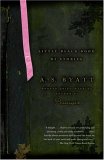Summary | Excerpt | Reading Guide | Reviews | Read-Alikes | Genres & Themes | Author Bio

Three narratives, set in the fifth, fourteenth, and twentieth centuries, all revolving around an ancient text and each with a love story at its center, are the elements of this ingenious novel, a follow-up to the bestselling, An Instance Of The Fingerpost.
"May well be the best historical mystery ever written," proclaimed The Sunday Boston Globe about Iain Pears's An Instance of the Fingerpost, while Booklist called its publication "a major literary event." Iain Pears's international bestseller was greeted with front-page reviews ("A crafty, utterly mesmerizing intellectual thriller"--The Washington Post Book World), named a New York Times Notable Book, and hailed as a Book to Remember by the New York Public Library. Now he returns with a greatly anticipated novel that is so brilliantly constructed, the author himself describes it as "a complexity."
The centuries are the fifth (the final days of the Roman Empire); the fourteenth (the years of the Black Death); and the twentieth (World War II). The setting for each is the same--Provence--and each has at its heart a love story. The narratives intertwine seamlessly, but what joins them thematically is an ancient text--"The Dream of Scipio"--a work of neo-Platonism that poses timeless philosophical questions. What is the obligation of the individual in a society under siege? What is the role of learning when civilization itself is threatened, whether by acts of man or nature? Does virtue lie more in engagement or in neutrality? "Power without wisdom is tyranny; wisdom without power is pointless," warns one of Pears's characters.

If you liked The Dream of Scipio, try these:

by Louis de Bernieres
Published 2005
Epic in its narrative sweep, steeped in historical fact yet profoundly humane, and dazzlingly evocative in its emotional and sensual detail. This is de Bernières' first book since Captain Corelli's Mandolin.

The Little Black Book of Stories
by A.S. Byatt
Published 2005
These unforgettable stories are by turns haunting, funny, sparkling, and scary. Byatt’s Little Black Book adds a deliciously dark note to her skill in mixing folk and fairy tales with everyday life.